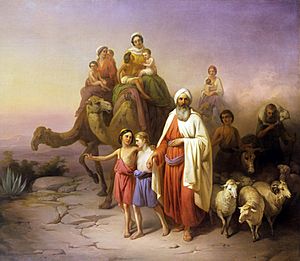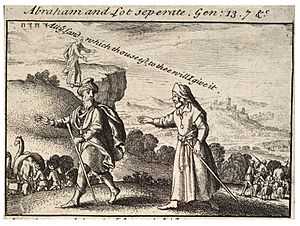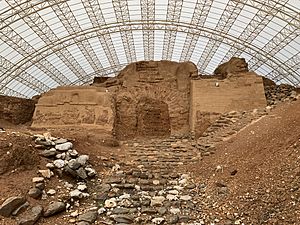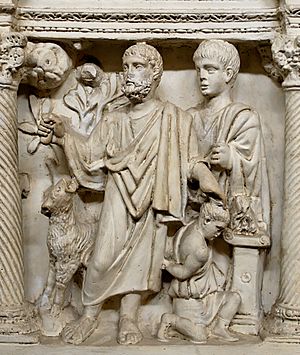Abraham facts for kids
| אַבְרָהָם | |
|---|---|
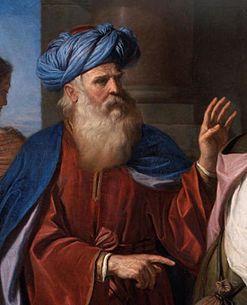
|
|
| Born | Abram ben Terah Ur Kaśdim, Chaldea, Sumer (present-day Iraq) |
| Died | Hebron, Canaan (present-day West Bank) |
| Significance | Namesake of the Abrahamic religions: traditional founder of the Jewish nation, spiritual ancestor of Christians, major Islamic prophet |
| Parent(s) |
|
| Spouse(s) | Sarah Hagar (concubine from Egypt) Keturah (also concubine) |
| Children | |
| Relative(s) |
Closest to furthest:
Haran (brother)
Nahor (brother) Sarah (half-sister and wife) Jacob (grandson) Esau (grandson) Lot (nephew) Twelve Tribes of Israel (great-grandsons) Dinah (great-granddaughter) ... Abraham's family tree |
Abraham (originally Abram) is a very important person in three major world religions: Judaism, Christianity, and Islam. These are often called the Abrahamic religions. In Judaism, he is seen as the first father of the Jewish people and their special connection with God. For Christians, he is like a spiritual father to all who believe. In Islam, he is a key prophet in a long line of prophets, leading up to Muhammad.
Abraham's life story is told in the Book of Genesis in the Bible. It focuses on two main ideas: having many descendants and owning land. God told Abraham to leave his home and go to a land called Canaan. God promised this land to Abraham and his future family. Later, Abraham's son Isaac inherited this promise. Abraham also bought a burial place in Hebron for his wife, Sarah. This showed his claim to the land.
Historians and archaeologists today mostly see the stories of Abraham as very old and important tales. They don't think they are exact historical records of a specific time. Instead, these stories likely developed over many years. They became very important to Jewish people, especially after they returned from being held captive in Babylon. The stories helped explain their connection to their land.
Contents
- Abraham's Amazing Journey
- His Early Life and God's Call
- A Trip to Egypt
- Abram and Lot Go Their Separate Ways
- Rescuing Lot
- God's Promise to Abraham
- Hagar and Ishmael
- Abraham and Sarah's New Names
- Three Special Visitors
- Abraham Asks God to Spare Sodom
- Abraham and King Abimelech
- Isaac's Birth
- Ishmael Leaves
- The Binding of Isaac
- Abraham's Later Years
- Abraham in Different Religions
- Abraham in Art
- Images for kids
- See also
Abraham's Amazing Journey
The stories about Abraham are like a collection of adventures. They are all connected because Abraham is in them, and they share themes of family and land. These themes start early in the story. They talk about how Sarah couldn't have children and how God told Abraham to leave his home for a new land.
His Early Life and God's Call
Abraham, whose first name was Abram, was a descendant of Noah. His father, Terah, had two other sons, Nahor and Haran. Haran was the father of Lot, who was Abram's nephew. Their whole family lived in a city called Ur of the Chaldees. Haran died in Ur. Abram married Sarai, but she could not have children.
Terah, Abram, Sarai, and Lot decided to move to Canaan. But they stopped and settled in a place called Haran. Terah died there. God then told Abram to leave his country and family. God promised to show him a new land. He also promised to make Abram a great nation. God said he would bless Abram and make his name famous. He would bless those who blessed Abram and curse those who cursed him.
Abram was 75 years old when he left Haran. He took Sarai, Lot, and all their belongings and people. They traveled to Shechem in Canaan. Then he set up his tent east of Bethel.
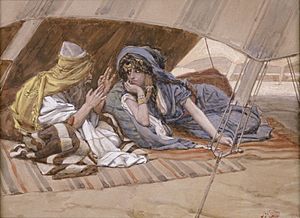
A Trip to Egypt
There was a terrible famine in Canaan. So, Abram, Lot, and their families went to Egypt. On the way, Abram asked Sarai to say she was his sister. He was afraid the Egyptians might kill him to take his beautiful wife.
When they arrived in Egypt, Pharaoh's officials told Pharaoh about Sarai's beauty. Pharaoh took her into his palace and gave Abram many gifts. But God sent plagues on Pharaoh and his household. Pharaoh soon found out that Sarai was Abram's wife. He demanded that Abram and Sarai leave Egypt.
Abram and Lot Go Their Separate Ways
After leaving Egypt, Abram and Lot lived in the Negev for a while. Then they returned to the Bethel and Ai area. Both Abram and Lot had very large herds of animals. Their herdsmen started having problems over grazing land.
To avoid conflict, Abram suggested that Lot choose a separate area. Lot decided to go east to the plain of Jordan. This land was well-watered all the way to Zoar. Lot settled near the cities of the plain, toward Sodom. Abram went south to Hebron. He settled in the plain of Mamre and built another altar to worship God there.
Rescuing Lot
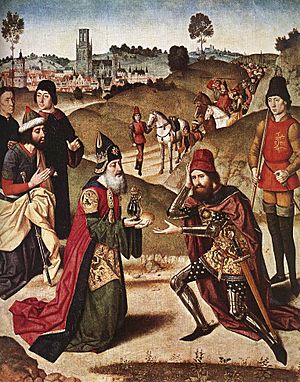
The cities in the Jordan River plain, including Sodom and Gomorrah, rebelled against the king of Elam. Abram's nephew, Lot, and his family were taken prisoner by the Elamite army. They were living on the edge of Sodom, which made them an easy target.
Someone who escaped told Abram what happened. Abram quickly gathered 318 trained servants. They chased the Elamite army north. The Elamite army was tired from a recent battle. Abram split his group and attacked at night near Dan. They freed the captives and chased the Elamite King Chedorlaomer. They rescued Lot, his family, and all their belongings. They also got back all the goods taken from Sodom.
When Abram returned, the king of Sodom came to meet him. Melchizedek, the king of Salem (Jerusalem) and a priest, brought bread and wine. He blessed Abram and God. Abram then gave Melchizedek a tenth of everything he had. The king of Sodom offered Abram all the recovered goods if he would just return the people. Abram refused, except for the share his allies deserved.
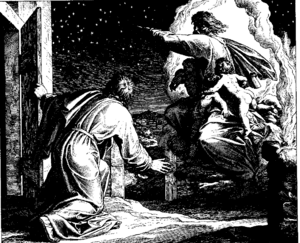
God's Promise to Abraham
God spoke to Abram in a vision. He promised again that Abram would have many descendants, as many as the stars. God also promised him the land. They made a special agreement, called a covenant. God told Abram that his descendants would be slaves in Egypt for a time. Then, God described the land his family would eventually own. This land belonged to many different groups of people.
Hagar and Ishmael
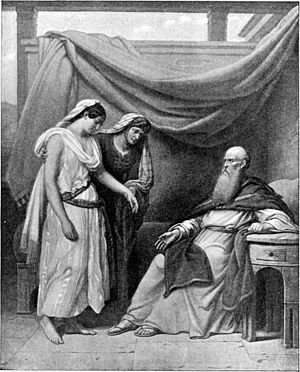
After 10 years in Canaan, Abram and Sarai still had no children. Sarai thought they needed to do something. She gave her Egyptian servant, Hagar, to Abram. Her plan was for Hagar to have a son for Abram.
When Hagar became pregnant, she started to look down on Sarai. Sarai then treated Hagar badly, and Hagar ran away into the desert. An angel spoke to Hagar by a spring of water. The angel told her to go back to Abram's camp. The angel also said her son would be a wild and free man. He would be against everyone, and everyone against him. He would live near his relatives. She was told to name her son Ishmael. Hagar then called God "El-roi", meaning "You are the God who sees me." The well was later named Beer-lahai-roi. Hagar returned and gave birth to Ishmael. Abram was 86 years old when Ishmael was born.
Abraham and Sarah's New Names
Thirteen years later, when Abram was 99 years old, God gave him a new name: "Abraham." This new name means "a father of many nations." Abraham then received more instructions about the covenant.
God also gave Sarai a new name: "Sarah." God blessed her and told Abraham, "I will give you a son through her." Abraham laughed to himself. He thought, "Can a man who is 100 years old have a child? And can Sarah, who is 90 years old, have a child?"
Three Special Visitors
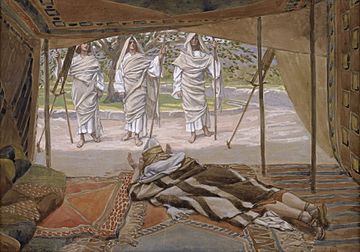
One hot day, Abraham was sitting at the entrance of his tent. He looked up and saw three men. He quickly ran to welcome them and bowed down. Abraham offered to wash their feet and bring them some food. They agreed.
Abraham hurried to Sarah's tent and told her to make bread from fine flour. Then he told a servant to prepare a choice calf. When everything was ready, he served them curds, milk, and the calf. He waited on them under a tree as they ate.
One of the visitors told Abraham that when he returned next year, Sarah would have a son. Sarah overheard this from the tent entrance. She laughed to herself, thinking about having a child at her old age. The visitor asked Abraham why Sarah laughed. He said, "Is anything too hard for God?" Sarah was scared and denied laughing.
Abraham Asks God to Spare Sodom
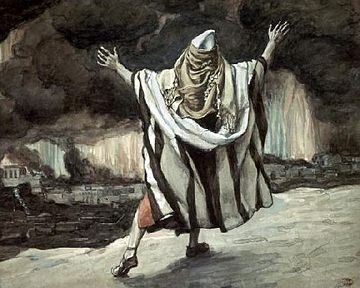
After eating, Abraham and the three visitors stood up. They walked to a hill overlooking the cities of the plain. They talked about the terrible sins of Sodom and Gomorrah. God planned to judge these cities. Since Abraham's nephew Lot lived in Sodom, God told Abraham about his plans. Two of the visitors then left for Sodom.
Abraham turned to God and began to plead. He asked if God would spare the city if 50 righteous people were found there. He kept asking, lowering the number each time, until he asked about just ten righteous people. God said that for the sake of ten righteous people, he would not destroy the city.
When the two visitors arrived in Sodom, Lot met them. He insisted they stay at his house. A crowd of men gathered outside Lot's home. They demanded that Lot bring out his guests so they could "know" them. Lot refused and even offered his own daughters instead. The crowd rejected this and tried to break down Lot's door. This showed how wicked the city was.
Early the next morning, Abraham went back to the place where he had spoken with God. He looked toward Sodom and Gomorrah. He saw smoke rising from the land like a furnace. Not even ten righteous people had been found there.
Abraham and King Abimelech
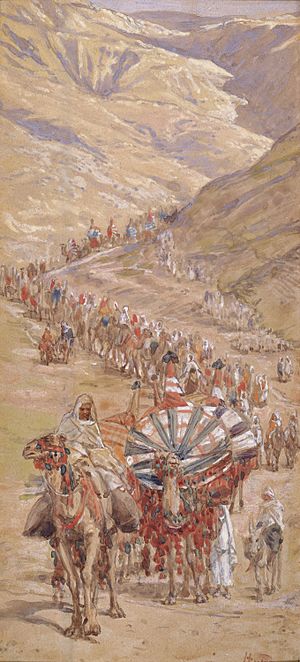
Abraham settled between Kadesh and Shur, in the land of the Philistines. While living in Gerar, Abraham again said that Sarah was his sister. King Abimelech heard this and had Sarah brought to him.
God came to Abimelech in a dream. God told him that taking Sarah would lead to death because she was a married woman. Abimelech had not touched her. He asked God if he would destroy an innocent nation, especially since Abraham had said they were siblings. God told Abimelech that he knew his heart was innocent. That is why he was still alive. But if he did not return Abraham's wife, God would destroy Abimelech and his whole household. God also told Abimelech that Abraham was a prophet who would pray for him.
The next morning, Abimelech told his servants about his dream. He then asked Abraham why he had brought such trouble upon his kingdom. Abraham explained that he thought there was no fear of God there. He believed they might kill him for his wife. Abraham then said he hadn't lied. He said, "She is indeed my sister; she is my father's daughter, but not my mother's daughter; and she became my wife."
Abimelech returned Sarah to Abraham. He also gave Abraham gifts of sheep, oxen, and servants. He invited Abraham to live anywhere he wanted in Abimelech's land. Abimelech also gave Abraham a thousand pieces of silver. This was to show that Sarah was innocent before everyone. Abraham then prayed for Abimelech and his family. God had made the women unable to have children because Sarah had been taken.
After some time, Abimelech and Phicol, his army chief, approached Abraham. There was a dispute over a well. Abraham complained to Abimelech because his Philistine servants had attacked and seized Abraham's well. Abimelech said he knew nothing about it. Abraham then made a pact with Abimelech. He gave him sheep and oxen. To prove that Abraham had dug the well, he also gave Abimelech seven ewes. Because of this promise, they called the place Beersheba. After Abimelech and Phicol returned to Philistia, Abraham planted a tamarisk grove in Beersheba. He called on "the name of the LORD, the everlasting God."
Isaac's Birth
As God had promised the year before, Sarah became pregnant. She gave birth to a son for Abraham. Abraham was 100 years old when his son, whom he named Isaac, was born. Sarah also laughed with joy. She said, "God has brought me laughter, and everyone who hears about this will laugh with me." Isaac grew up. On the day he was weaned, Abraham held a big feast. During the celebration, Sarah saw Ishmael making fun of Isaac. This made it clear who would inherit Abraham's promises.
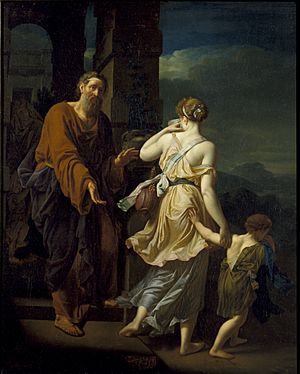
Ishmael Leaves
Ishmael was 14 years old when Isaac was born. When Sarah saw Ishmael teasing Isaac, she told Abraham to send Hagar and Ishmael away. She said Ishmael would not share in Isaac's inheritance. Abraham was very upset by this. He asked God for advice. God told Abraham not to be upset. He said to do as Sarah commanded. God promised Abraham that his family line would continue through Isaac. But he also said that Ishmael would become a great nation, because he was Abraham's son too.
Early the next morning, Abraham sent Hagar and Ishmael away. He gave her bread and water. They wandered in the wilderness of Beersheba until their water ran out. Hagar cried in despair. God heard the boy's voice. An angel of the Lord told Hagar that Ishmael would become a great nation. He would be "living on his sword." A well of water then appeared, saving their lives. As Ishmael grew, he became a skilled archer in the wilderness of Paran. His mother later found a wife for him from Egypt.
The Binding of Isaac
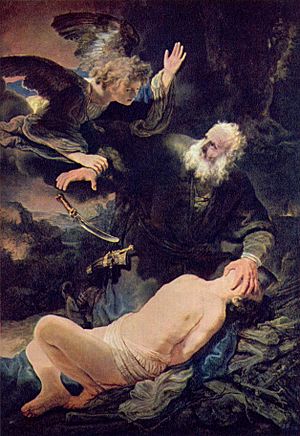
One day, God commanded Abraham to offer his son Isaac as a sacrifice. This was to happen in the land of Moriah. Abraham traveled for three days until he reached the mountain God told him about. He told his servants to stay behind. He and Isaac went up the mountain alone. Isaac carried the wood for the sacrifice. Along the way, Isaac asked his father where the animal for the offering was. Abraham replied, "God himself will provide the lamb for the burnt offering."
Just as Abraham was about to sacrifice his son, an angel of the Lord stopped him. Abraham then saw a ram caught in a bush by its horns. He sacrificed the ram instead of his son. The place was later named Jehovah-jireh, meaning "The Lord will provide." Because of Abraham's obedience, God promised him countless descendants and great wealth. After this event, Abraham went to Beersheba.
Abraham's Later Years
Sarah died, and Abraham buried her in the Cave of the Patriarchs. He bought this cave and the nearby field from Ephron the Hittite. After Sarah's death, Abraham married another woman named Keturah. With Keturah, he had six more sons: Zimran, Jokshan, Medan, Midian, Ishbak, and Shuah.
The Bible says Abraham is the ancestor of many nations. These include the Israelites, Ishmaelites, Edomites, Amalekites, Kenizzites, Midianites, and Assyrians. Through his nephew Lot, he was also related to the Moabites and Ammonites. Abraham lived to see his son Isaac marry Rebekah. He also saw the birth of his twin grandsons, Jacob and Esau. Abraham died at 175 years old. His sons Isaac and Ishmael buried him in the cave of Machpelah.
Abraham in Different Religions
Abraham is highly respected in three major world faiths: Judaism, Christianity, and Islam.
Judaism
In Jewish tradition, Abraham is called Avraham Avinu, which means "our father Abraham." This shows he is both the ancestor of the Jewish people and the founder of Judaism. His story is read every week in the Torah readings.
Jewish stories say that God created the world because of Abraham's goodness. After the great flood, Abraham was the only one who promised to always follow God. He studied with Noah and Shem to learn about God's ways. In his youth, Abraham was saved from a fiery furnace after he broke idols. Abraham was known for being kind to travelers and teaching them about God.
Abraham, along with Isaac and Jacob, is so important that God is often called "the God of Abraham, Isaac, and Jacob." He is also believed to be the author of the Sefer Yetzirah, an early book on Jewish mysticism. Jewish tradition says Abraham went through ten tests from God. The Binding of Isaac was one of these tests.
Christianity
| Abraham | |
|---|---|
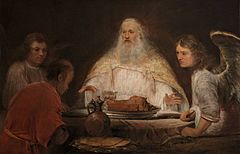
Abraham and the Angels, by Aert de Gelder, circa 1680–85.
|
|
| First Patriarch | |
| Venerated in | |
| Feast | 9 October – Roman Catholicism and Lutheranism |
In Christianity, Abraham is honored as a prophet. God chose to show himself to Abraham and made a special agreement with him. Paul the Apostle taught that all who believe in Jesus are like "children of Abraham." This means they share in the promises God made to Abraham. In the book of Romans, Abraham is praised for his strong faith in God. This faith is connected to how Christians believe in Jesus.
Throughout history, Christian leaders have called Abraham the spiritual father of all Christians. For example, Augustine of Hippo said Christians are "children of Abraham by faith." The Roman Catholic Church calls Abraham "our father in Faith" during their Mass. He is also remembered in the calendars of saints by several Christian groups.
Some Christian thinkers believe the "three visitors" Abraham met were a sign of the Holy Trinity.
Islam
Islam sees Abraham, known as Ibrāhīm, as a key prophet. He is part of the line of prophets that started with Adam and ended with Muhammad. The Quran mentions Ibrāhīm more often than any other biblical person except Moses. He is called a hanif (a true believer in one God) and a muslim (one who submits to God).
Muslims see him as a prophet and a great leader. He is the perfect example of a Muslim. He is also honored for rebuilding the Kaaba in Mecca. Islamic traditions say Ibrāhīm was the first pioneer of Islam. His life's goal was to teach about the Oneness of God. In Islam, Abraham is highly respected. He is called "Ibrahim Khalilullah," meaning "Abraham the Beloved of God."
Besides Ishaq (Isaac) and Yaqub (Jacob), Ibrahim is among the most honored people in God's eyes. The Quran also calls Ibrahim the "Father of Muslims" and a role model for the community.
Druze Faith
The Druze faith considers Abraham the third important teacher. He helped share the main ideas of believing in one God. He is also one of seven prophets who appeared at different times in history for the Druze faith.
Mandaeism
In Mandaeism, Abraham is mentioned in their holy book, the Right Ginza. He is seen as the leader of the Jewish people. Mandaeans believe Abraham was originally a Mandaean priest.
Abraham in Art
Paintings and sculptures about Abraham often show a few main events. These include the sacrifice of Isaac, his meeting with Melchizedek, and entertaining the three angels. Artists like Albrecht Dürer, Caravaggio, Rembrandt, and James Tissot have created many works about Abraham's life.
The Sarcophagus of Junius Bassus is a famous early Christian sculpture from 359 AD. It shows Bible stories, including Abraham about to sacrifice Isaac. This sculpture is in the Vatican. These scenes were chosen to show how Old Testament events pointed to Christ's sacrifice.
George Segal made a sculpture in 1987 called Abraham's Farewell to Ishmael. It shows Abraham, Sarah, and Hagar. The sculpture captures the deep feelings of the family when Abraham had to send Hagar and Ishmael away.
Christian Art Symbols
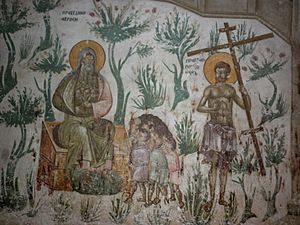
In Christian art, Abraham is usually recognized by the scene he is in. This could be his meeting with Melchizedek, the three visitors, or the sacrifice of Isaac. In pictures of just Abraham, he might hold a sword or knife. He always has a gray or white beard.
Early Christian art often showed the sacrifice of Isaac as a sign of Christ's sacrifice. For example, an 11th-century Christian altar shows Abraham's sacrifice. This was meant to represent Christ's sacrifice in the Eucharist.
Some early Christian writers thought the three visitors Abraham met represented the triune God. In some art, like a 5th-century mosaic in Rome, only the visitors are shown. In Eastern Orthodox art, this visit is a main way to show the Trinity. Some famous paintings, like Andrei Rublev's Trinity, only show the three visitors.
Images for kids
-
Abraham's well at Beersheba, Israel.
See also
 In Spanish: Abraham para niños
In Spanish: Abraham para niños
 | Audre Lorde |
 | John Berry Meachum |
 | Ferdinand Lee Barnett |


